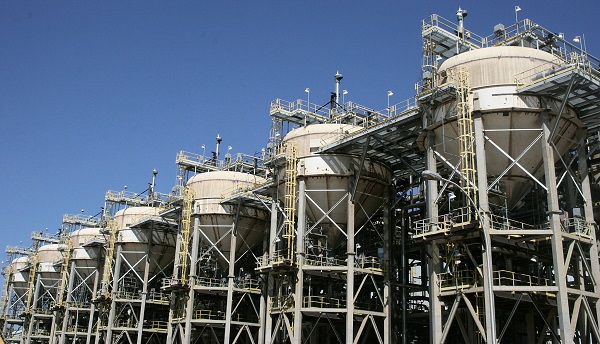Alberta
“It’s Canada’s Time to Shine” – CNRL’s $6.5 Billion Chevron Deal Extends Oil Sands Buying Spree

From Energy Now
Canadian Natural Resources Ltd.’s $6.5 billion acquisition from Chevron Corp. marks the latest in a string of deals that has helped make it the country’s largest oil producer and brought Alberta’s massive oil sands deposits almost entirely under local control.
CNRL has feasted on the oil sands assets of foreign energy producers over the past decade, snapping up stakes and operations from Devon Energy Corp. and Shell Plc as they shifted away from the higher-cost, higher-emissions oil sands business. Investors have applauded the strategy, which allows CNRL to boost output and make the operations more efficient.
That trend continued on Monday, with CNRL shares climbing more than 4% after the deal with Chevron raised its stake in a key oil sands mine and a connected upgrading facility, while also adding natural gas assets in the Duvernay formation.
“These assets build on the robustness of Canadian Natural’s assets,” said CNRL President Scott Stauth said on a conference call Monday. The deal boosts CNRL’s stake in the Athabasca oil sands project, which it first bought from Shell in 2017, to 90% from 70%.
The acquisition was largely expected and boosts CNRL’s oil and gas output by roughly 9%, adding the equivalent of 122,500 barrels of oil production per day.
“It’s just been a matter of time,” Eight Capital analyst Phil Skolnick said by phone, noting that CNRL had been seen as the logical buyer for Chevron’s oil sands business.
While CNRL also boosted its dividend by 7% on Monday, Desjardins analyst Chris MacCulloch cautioned the company’s additional debt to finance the acquisition “may disappoint some investors” given it plans to temporarily slow capital returns.
Still, MacCulloch said the deal is positive overall for CNRL as it further consolidates assets in the region. “There’s no place like home,” he wrote in a note.
Chevron, for its part, is the latest in a long line of US and international oil producers — such as BP Plc, TotalEnergies SE and Equinor ASA — that have shifted away from the oil sands after spending billions to build facilities in the heavy-oil formation. That has left the oil sands largely in the control of Canadian firms including CNRL, Suncor Energy Inc. and Cenovus Energy Inc.
“There’s no remaining, obvious assets available,” Ninepoint Partners partner and senior portfolio manager Eric Nuttall said after Monday’s deal. Ninepoint owns 3.1 million shares in CNRL, data compiled by Bloomberg show.
Many of those oil sands deals have been struck at prices that favor the Canadian buyers, which have consolidated land, reduced costs and boosted returns in recent years.
“It’s Canada’s time to shine,” Nuttall said, adding that he expects foreign investors will return to the country’s oil producers in the future.
Alberta
Alberta taxpayers should know how much their municipal governments spend

From the Fraser Institute
By Tegan Hill and Austin Thompson
Next week, voters across Alberta will go to the polls to elect their local governments. Of course, while the issues vary depending on the city, town or district, all municipal governments spend taxpayer money.
And according to a recent study, Grande Prairie County and Red Deer County were among Alberta’s highest-spending municipalities (on a per-person basis) in 2023 (the latest year of comparable data). Kara Westerlund, president of the Rural Municipalities of Alberta, said that’s no surprise—arguing that it’s expensive to serve a small number of residents spread over large areas.
That challenge is real. In rural areas, fewer people share the cost of roads, parks and emergency services. But high spending isn’t inevitable. Some rural municipalities managed to spend far less, demonstrating that local choices about what services to provide, and how to deliver them, matter.
Consider the contrast in spending levels among rural counties. In 2023, Grande Prairie County and Red Deer County spent $5,413 and $4,619 per person, respectively. Foothills County, by comparison, spent just $2,570 per person. All three counties have relatively low population densities (fewer than seven residents per square kilometre) yet their per-person spending varies widely. (In case you’re wondering, Calgary spent $3,144 and Edmonton spent $3,241.)
Some of that variation reflects differences in the cost of similar services. For example, all three counties provide fire protection but in 2023 this service cost $56.95 per person in Grande Prairie County, $38.51 in Red Deer County and $10.32 in Foothills County. Other spending differences reflect not just how much is spent, but whether a service is offered at all. For instance, in 2023 Grande Prairie County recorded $46,283 in daycare spending, while Red Deer County and Foothills County had none.
Put simply, population density alone simply doesn’t explain why some municipalities spend more than others. Much depends on the choices municipal governments make and how efficiently they deliver services.
Westerlund also dismissed comparisons showing that some counties spend more per person than nearby towns and cities, calling them “apples to oranges.” It’s true that rural municipalities and cities differ—but that doesn’t make comparisons meaningless. After all, whether apples are a good deal depends on the price of other fruit, and a savvy shopper might switch to oranges if they offer better value. In the same way, comparing municipal spending—across all types of communities—helps Albertans judge whether they get good value for their tax dollars.
Every municipality offers a different mix of services and those choices come with different price tags. Consider three nearby municipalities: in 2023, Rockyview County spent $3,419 per person, Calgary spent $3,144 and Airdrie spent $2,187. These differences reflect real trade-offs in the scope, quality and cost of local services. Albertans should decide for themselves which mix of local services best suits their needs—but they can’t do that without clear data on what those services actually cost.
A big municipal tax bill isn’t an inevitable consequence of rural living. How much gets spent in each Alberta municipality depends greatly on the choices made by the mayors, reeves and councillors Albertans will elect next week. And for Albertans to determine whether or not they get good value for their local tax dollars, they must know how much their municipality is spending.
Alberta
Premier Smith addresses the most important issue facing Alberta teachers: Classroom Complexity

Premier Danielle Smith is posting this response to a media question about Classroom Complexity.
While Albertans are hearing a lot about capping class sizes, Premier Smith says it might be a much better idea to talk about capping “complexity”.
The challenges teachers face in today’s classrooms are recognized, and work continues toward practical solutions that address their concerns.
Achieving a fair and reasonable agreement that best supports students remains a top priority. pic.twitter.com/o4UCt7sDoU
— Danielle Smith (@ABDanielleSmith) October 16, 2025
-

 Censorship Industrial Complex2 days ago
Censorship Industrial Complex2 days agoCanada’s privacy commissioner says he was not consulted on bill to ban dissidents from internet
-

 Health2 days ago
Health2 days agoColorado gave over 500 people assisted suicide drugs solely for eating disorders in 2024
-

 Alberta2 days ago
Alberta2 days agoEnbridge CEO says ‘there’s a good reason’ for Alberta to champion new oil pipeline
-

 Business2 days ago
Business2 days agoFormer Trump Advisor Says US Must Stop UN ‘Net Zero’ Climate Tax On American Ships
-

 Alberta2 days ago
Alberta2 days agoThe Technical Pitfalls and Political Perils of “Decarbonized” Oil
-

 International2 days ago
International2 days agoNumber of young people identifying as ‘transgender’ declines sharply: report
-

 Bruce Dowbiggin2 days ago
Bruce Dowbiggin2 days agoLong-Distance Field Goals Have Flipped The Field. Will The NFL Panic?
-

 Business2 days ago
Business2 days ago“Nation Building,” Liberal Style: We’re Fixing a Sewer, You’re Welcome, Canada








